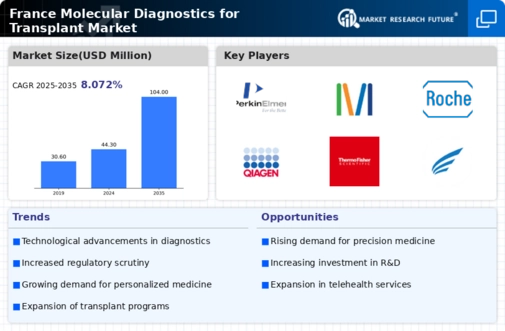Emerging Market Opportunities
The Global France Molecular Diagnostics for Transplant Market Industry is witnessing emerging opportunities due to the expansion of healthcare infrastructure and increasing investment in biotechnology. As new players enter the market, there is a potential for innovative diagnostic solutions tailored to the specific needs of transplant patients. This diversification may lead to enhanced competition and improved product offerings. Additionally, collaborations between biotechnology firms and healthcare providers could further stimulate market growth, paving the way for advancements in molecular diagnostics that cater to the evolving landscape of transplantation.
Market Trends and Projections
The Global France Molecular Diagnostics for Transplant Market Industry is characterized by dynamic trends and projections that indicate robust growth. The market is expected to reach 3500 USD Million by 2035, driven by factors such as technological advancements and increasing demand for transplantation. The compound annual growth rate of 9.81% from 2025 to 2035 highlights the potential for continued expansion. These trends suggest a favorable environment for stakeholders, as the industry adapts to the changing needs of patients and healthcare providers, ensuring that molecular diagnostics remain at the forefront of transplant medicine.
Rising Demand for Transplantation
The Global France Molecular Diagnostics for Transplant Market Industry is experiencing a notable increase in demand for organ transplantation. This surge can be attributed to the growing prevalence of chronic diseases and organ failures, necessitating effective diagnostic solutions. In 2024, the market is valued at approximately 1250 USD Million, reflecting the urgent need for advanced molecular diagnostics to ensure successful transplant outcomes. As the population ages and the incidence of conditions requiring transplantation rises, the industry is poised for substantial growth, with projections indicating a market expansion to 3500 USD Million by 2035.
Government Initiatives and Funding
Government initiatives aimed at improving transplant outcomes significantly influence the Global France Molecular Diagnostics for Transplant Market Industry. Various health authorities are investing in research and development to enhance diagnostic capabilities. Funding programs support the integration of molecular diagnostics into clinical practice, thereby promoting better patient management. These efforts are likely to foster collaboration between public and private sectors, driving innovation and accessibility in transplant diagnostics. As a result, the market is expected to grow, reflecting the commitment of governments to improve healthcare infrastructure and patient care.
Increasing Awareness and Education
Awareness and education regarding the importance of molecular diagnostics in transplantation are pivotal for the Global France Molecular Diagnostics for Transplant Market Industry. Healthcare professionals and patients are becoming more informed about the benefits of molecular testing, leading to increased demand for these services. Educational campaigns and training programs are being implemented to enhance understanding of transplant procedures and the role of diagnostics in improving outcomes. This growing awareness is likely to contribute to market growth, as more stakeholders recognize the value of molecular diagnostics in ensuring successful transplantations.
Technological Advancements in Diagnostics
Technological innovations play a crucial role in shaping the Global France Molecular Diagnostics for Transplant Market Industry. The introduction of next-generation sequencing and other advanced molecular techniques enhances the accuracy and speed of transplant diagnostics. These innovations facilitate better donor-recipient matching, thereby improving transplant success rates. As healthcare providers increasingly adopt these technologies, the market is expected to witness a compound annual growth rate of 9.81% from 2025 to 2035. This trend underscores the importance of integrating cutting-edge diagnostic tools into transplant protocols to optimize patient outcomes.


















Leave a Comment